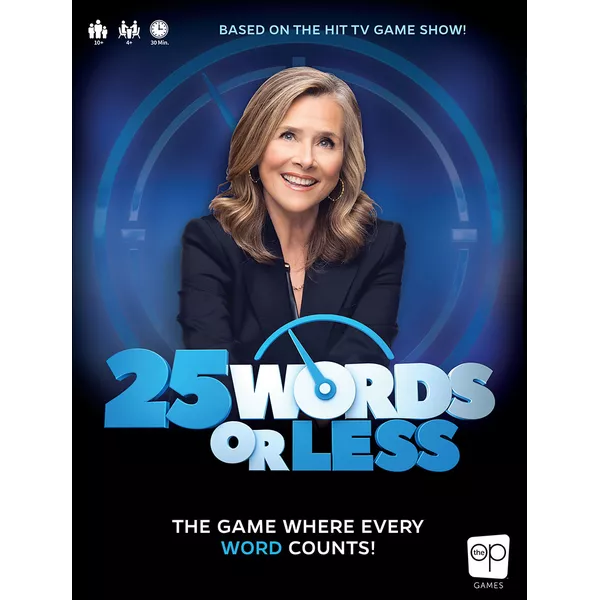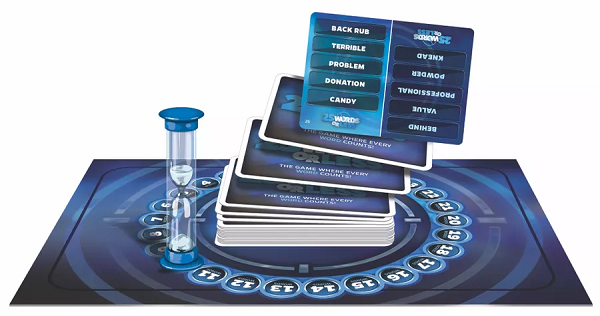Can You Give Clues to Secret Words in 25 Words or Less?

Get your team to guess five secret words, but choose your clues carefully because you’re limited in the number of words you can speak. If you fail, the other team will steal the point!
25 Words or Less is a team-based party game published by The Op and designed for four or more players.
Gameplay
Players split into two teams. In each round, one player from each team is selected to be the clue giver for that round. The two clue givers draw a card together and study the five answer words listed on it for roughly 15 seconds. The two clue givers then try to underbid each other, saying how many words they will need to speak to clue their teammates to the five words.
The first bid must be between 20 and 25 words, but after that, players can go down as low as they wish. Once one of the clue givers has backed out, the player who lost the bid becomes the judge for the round and uses the board to track how many words the winning clue giver speaks.
The one-minute timer is started and the clue giver tries to get his team to guess all five answers listed on the card. The only words the clue giver can speak that will not count as part of his word limit are ‘yes’ or ‘correct’, as well as ‘pass’ if he wants to move on to another answer word on the card.
If the clue giver’s team guesses all five words before either the timer runs out or the clue giver exceeds his word count, they win the card as a point. If they fail to do so, then the other team takes the card for a point. You then start a new round with two different team members being selected as the clue givers. The first team to 10 points wins the game.

Review
Being limited on the number of words you can use puts a fun spin to this type of clue-giving party game. It’s so easy to accidentally use more words than you intend to help your teammates get to a word, as the timer runs down and you start to see them going off track.
There’s a nice range on the cards between challenging words and easy ones, and of course it’s going to vary from player to player which ones are which, but there’s a wide selection of words used. There’s also quite a lot of cards included in the game, and two sets of words are shown on each card. You’re not going to run out of words any time soon.
The bidding mechanism can be fun, and it’s exciting to bid each other down. It can feel almost like a push-your-luck game, as you start to go lower and lower on the word count and try to decide how far you can go or when you should pull out and leave the other team with the bid. This does add a fun extra layer to the game, especially as the game encourages both players not to think too hard about what clues they will actually give, but to go with their guts while making their bids.
However, there is also an issue with this bidding mechanism. In this type of party game, you really want all players to have a chance to play both roles (guesser and clue giver). But the way the bidding is structured, especially in a larger game with more players, it is possible to not get a chance to be the clue giver (or enjoy this role less often than other players) if you are outbid by the opposing clue giver on your turn. In this game, it is likely that players won't have an equal number of chances to give clues.
25 Words or Less is a challenging party game, with a fun twist on the clue-giving, and an interesting bidding system. It’s unfortunate that the role of clue giver is unevenly spread out, especially in larger groups — but with a smaller group, this is likely less of a problem.
Pros: The limit on words adds a fun challenge to the clue-giving, lots of cards are included in the box, bidding is a unique mechanism for this type of party game
Cons: The role of clue giver can be unevenly spread out due to the bidding mechanism
Disclosure: We received a complimentary review copy of this game.







